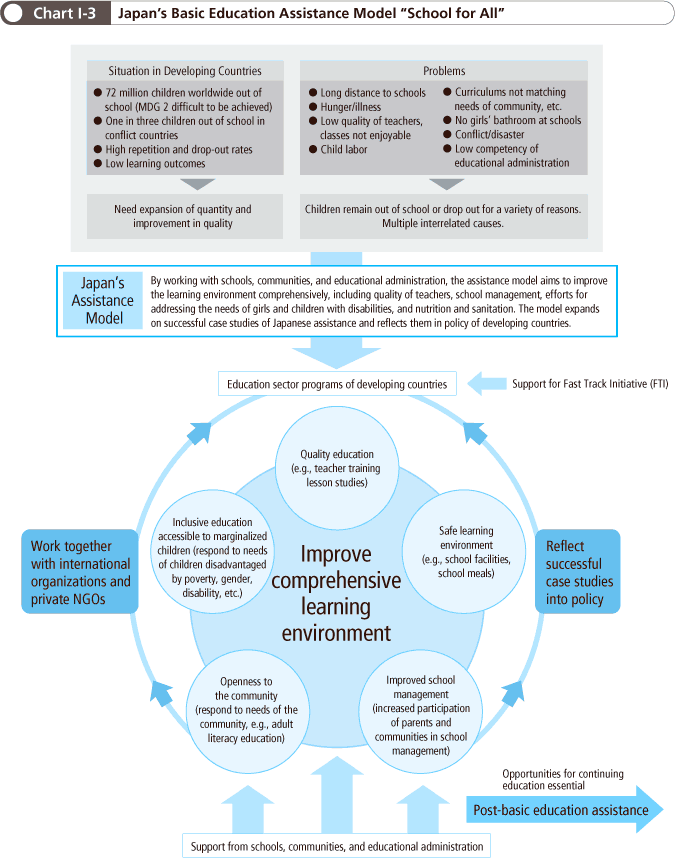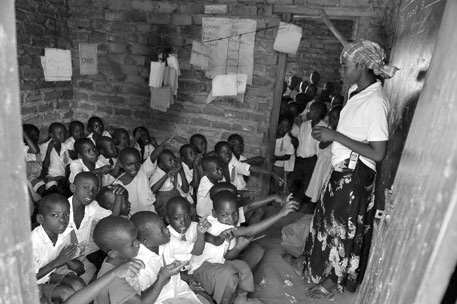Japan's Official Development Assistance White Paper 2010
2. New Education Policy
Education builds a foundation that enables people to participate in society. Japan has emphasized assistance in the education sector as one of the essential components for promoting human security. In 2002, Japan announced the “Basic Education for Growth Initiative (BEGIN)”, which defines priority areas as ensuring access to education, improving quality of education, and improving management of education, and has provided both hard and soft assistance, including assistance for the construction of schools and teacher training.
In 2010, with five years remaining until the 2015 deadline for the achievement of the MDGs and the Education for All (EFA) (Note 5) goals, Japan newly established “Japan’s Education Cooperation Policy 2011– 2015”, taking into account the diverse needs of developing countries as well as the trends of international discussions on education assistance. Japan unveiled the policy on the occasion of the UN Summit on the MDGs. Prime Minister Kan announced that, based on this policy, Japan will provide US$3.5 billion of assistance over five years beginning in 2011 to ensure that children around the world, including marginalized children and children in conflict countries, have access to education. Through this policy, Japan will help to provide a quality educational environment for at least 7 million children (a cumulative total of approximately 25 million children).
The new policy is a comprehensive policy which addresses the education sector as a whole, and is comprised of three pillars: (1) Basic education support; (2) Support for post-basic education (secondary education following completion of primary education, vocational training, and higher education); and (3) Education support in vulnerable countries affected by conflicts and disasters. Under this policy, Japan will strive to contribute to the achievement of the education-related MDGs and EFA goals, and look ahead beyond 2015 in implementing cooperation and promote the realization of human security.
For basic education support, an area directly linked to the achievement of MDG 2 (Achieve universal primary education), Japan will improve the learning environment comprehensively based on the assistance model of “School for All”, working together with schools, communities, and educational administration. Specifically, Japan will offer appropriate support in line with the country’s needs, focusing on the following five interrelated components: (1) Quality education (e.g., quality of teachers); (2) Safe learning environment (e.g., nutrition, sanitation); (3) Improving school management; (4) Openness to the community; and (5) Inclusive education (addressing the needs of children who are unable to enroll in schools due to poverty, conflict, disability, etc.). Japan will also strengthen support for the Fast Track Initiative (FTI) (Note 6) — the international framework for accelerating progress towards achieving universal primary education, and will actively participate in the discussion on and the implementation of the reform process and increase contribution to the fund established by the FTI.

In today’s global knowledge-based society, post-basic education is becoming increasingly important in advancing economic growth and international competitiveness and reducing poverty. With the expansion of primary education, there is rising demand for post-basic education. In view of these circumstances, Japan will strengthen vocational training schools to be used as a base for post-basic education, promote the development of networks for higher education, and promote international exchanges and the acceptance of international students by Japanese schools in particular.
Twenty-five million children — approximately 35% of the out-of-school children in the world — live in low-income countries affected by conflicts. In this light, Japan will redouble efforts for education support in vulnerable countries which suffered conflicts and natural disasters.

An elementary school classroom (Uganda) (Photo: Koji Sato/JICA)
Notes:
(5) At the World Conference on Education for All held in Jomtien, Thailand in 1990, it was confirmed that all children, youths, and adults should have access to basic education (education to acquire the knowledge and skills necessary for survival and education to meet basic learning needs).
(6) An international assistance framework established in April 2002 aimed at promoting the achievement of “universal primary education by 2015” included in the goal of the EFA Dakar Framework for Action and the MDGs.
